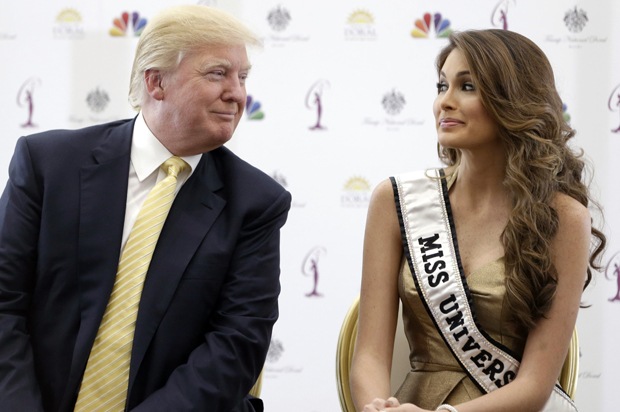Last week’s now-famous dust-up at the Miss Universe competition (formerly owned by Donald Trump)—when the “wrong” woman was crowned the winner—revealed the intersection between beauty pageants and our current political pageant.
For several minutes, the mistaken announcement of the winner went uncorrected, and the presumed Miss Universe, Ariadna Gutierrez of Colombia, wept happy tears and waved. The other finalist, Miss Philippines, Pia Alonzo Wurtzbach, believing herself the runner-up, smiled graciously and retreated upstage.
But soon after, host Steve Harvey faced the pitiable task of acknowledging his error, apologizing, and then watching last year’s Miss Universe gently divest Gutierrez of her crown (patting her consolingly on the back as she did so) and reposition it atop the (presumably more deserving) tresses of Wurtzbach, Miss Philippines. Wurtzbach looked shocked and confused, and covered her mouth with her hand. “Now, take your first walk as Miss Universe!” intoned Harvey, but she seemed rooted to the floor in shock.
The mishap made for great television: a spectacle mingling triumph, embarrassment, disappointment, humiliation, fear and elation—an entire spectrum of human emotion unspooling within the space of about three minutes.
The media leapt upon it. “The worst disaster in award show history,” crowed one tabloid headline. The Daily Beast dubbed it “an epic fail.” Most major newspapers and countless television shows have now featured the story as entertainment news, a funny, if cringe-inducing item, something for the blooper reels. One article even speculated it had all been a conspiracy, designed to raise ratings and boost Steve Harvey’s career.
But there’s more than opera buffa here.
In fact, the great Miss Universe mixup offers an excellent moment to call for an end to beauty pageants. Once upon a time, feminists openly condemned such contests, and with good reason. But then, somehow, it became unfashionable to object to parading young women around and assigning them numerical ratings like cattle at the marketplace. Only retro, “second-wave” feminists would balk at seeing fully clothed, middle-aged male talk-show hosts (Harvey is 59) presiding over dozens of college-age women in plunging gowns and skimpy swimsuits. “It’s the women’s free choice,” goes the faux-feminist refrain that defends this practice, as if we didn’t need to investigate why such a “choice” even exists — and only for women. Consider how absurd the situation would be if the genders were reversed: Imagine a male beauty pageant in which, say, Ellen DeGeneres or Oprah Winfrey “hosted” 80 young men posing in Speedos.
The Miss Universe kerfuffle proves it’s time to call foul on this double standard and lodge once again a proud, not just feminist, but humanist protest against the anachronism of the beauty pageant. What more evidence do we need of how condescending and objectifying these pageants are than that excruciating interregnum moment, as the title was wrenched away from winner No. 1? Turning slowly from joy to horror, Miss Colombia’s face told us all we need to know: Beauty pageants are cruel and this moment proved it.
The emotional extremes of Sunday’s spectacle represented a difference in degree rather than in kind of entertainment, helping us to see that, ultimately, all pageants are really about providing just such moments of prurience and schadenfreude. Why else would the media keep replaying that painful scene? The very point of televised pageants is to pit young women against one another, like gladiators in the ring, and encourage the public’s delectation in watching as each contestant (save one) is adjudged lacking in some way and then “eliminated.” This year, for the first time, viewers of the Miss Universe pageant could even participate actively in this process, casting their own votes online. Everyone is an expert on beauty, after all. What a lamentable message this sends about what we prize in women.
What’s more, sexual politics cannot be separated from politics overall, for the way we treat women always bespeaks a more general attitude toward humanity. All human beings are diminished when we treat any among us as objects or lists of physical attributes. And this is where sexism meets racism and xenophobia. When you reduce people to statistics and labels you dehumanize them, whether you are quantifying (and yes, even celebrating) “beauty,” or demonizing specific ethnicities, religious groups or nationalities.
We have been awash in dehumanizing rhetoric lately, of which a good deal has issued from the mouth of Republican presidential candidate Donald Trump, who was forced to sell his stake in the Miss Universe pageant after he publicly insulted Mexican journalist Jorge Ramos. “Go back to Univision,” Trump had jeered contemptuously at Ramos, before having him ejected from a press conference. In response, Univision refused to televise the pageant in Latin America unless Mr. Trump relinquished his ownership.
“Thankfully Donald Trump no longer owns this pageant,” proclaimed one of the evening’s judges, celebrity blogger Perez Hilton, as if somehow that liberated the spectacle politically. It does not.
Donald Trump divides the world into winners and losers, “us” and “them,” acceptable and unacceptable groups. That he also prides himself on being a great arbiter of feminine beauty is only an extension of his divisive, Manichean worldview. Recall his callous remarks about Republican rival Carly Fiorina: “Look at that face. Who would vote for that face?” he sneered, conflating presidential politics and beauty pageants. Trump may not own the Miss Universe pageant anymore, but his worldview permeates all beauty pageants, and more important, underpins his presidential campaign.
Vilifying Mexicans one day, Muslims the next, Trump debases our national conversation with Barnum-esque demagoguery, which led him to muse years ago in an interview: “It doesn’t matter what the media write about you as long as you have a young and beautiful piece of [a**].” Let’s see the connection for what it reveals: The repugnance of Trump’s political rhetoric is inextricable from the prurience of televised beauty pageants. Let’s change the channel.


